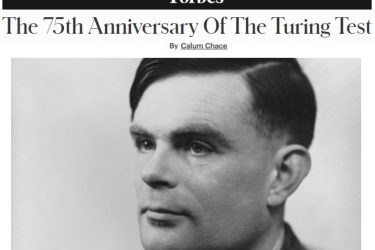1. Almost all big non-tech companies will work hard to deploy AI – and to be seen to be doing so. One consequence will be the growth of “insights-as-a-service”, where external consultants are hired to apply machine learning to corporate data. Some of these consultants will be employees of Google, Microsoft and Amazon, looking to make their open source tools the default option (e.g. Google’s TensorFlow, Microsoft’s CNTK, Amazon’s MXNet).
2. The first big science breakthrough that could not have been made without AI will be announced. (I stole this from DeepMind’s Demis Hassabis. I want to get at least one prediction right!)
3. There will be media reports of people being amazed to discover that a customer service assistant they have been exchanging messages with is a chatbot.
4. Voice recognition won’t be quite good enough for most of us to use it to dictate emails and reports – but it will become evident that the day is not far off.
5. Some companies will appoint Chief Artificial Intelligence Officers (CAIOs).
6. Capsule networks will become a buzz word. These are a refinement of deep learning, and are being hailed as a breakthrough by Geoff Hinton, the man who created the AI Big Bang in 2012.
7. Breakthroughs will be announced in systems that transfer learning from one domain to another, avoiding the issue of “catastrophic forgetting”, and also in “explainable AI” – systems which are not opaque black boxes whose decision-making cannot be reverse engineered. These will not be solved problems, but encouraging progress will be demonstrated.
8. There will be a little less Reverse Luddite Fallacism, and a little more willingness to contemplate the possibility that we are heading inexorably to a post-jobs world – and that we have to figure out how to make that a very good thing. (I say this more in hope than in anticipation.)



